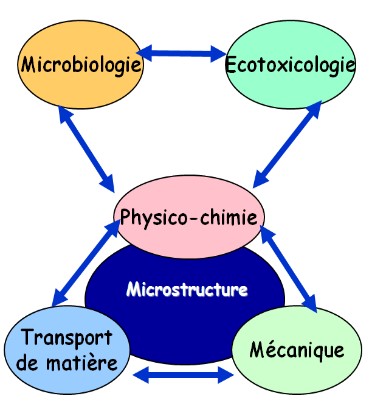Responsible : Nor-Edine ABRIAK
The work of this team is at the interface between Civil Engineering and Environmental Engineering. The team is interested in innovative materials, which may contain by-products, industrial co-products or waste. The team studies their behavior, their sustainability and their environmental impact. This approach is part of a value chain logic.

The recovery of mineral matter from by-products, industrial co-products or waste is an increasingly strong necessity in our society. One of the major challenges is to develop the economic and application potential with a view to exploiting the enormous quantities produced annually. Materials dedicated to construction and health have great potential for evolution through specific applications leading to the use of more efficient and innovative materials. However, this development will be achieved through controlled durability and via new functionalities.
Given the complexity and transversality in terms of skills in these areas, the team's approach aims to understand the complex couplings governing the interactions between materials and their environment through an experimental multi-scale approach supplemented by numerical simulations.
The works are classified into three topics :
- marine and river sediments,
- dairy,
- household waste incineration bottom ash (MIDND) and coal bottom ash,
- recycled concrete aggregates (GBR),
- cements and ceramics.
- The development ofeco-materials with multi-physical performance (physico-mechanical, thermal and acoustic) by combining the problems of valuing industrial and / or agricultural co-products while limiting the environmental footprint of these products and achieving life cycle analysis (LCA). tout en limitant l’empreinte environnementale de ces produits et en réalisant une analyse de cycle de vie (ACV).
- Thedevelopment of innovative cements with controlled performance in order to improve existing products while reducing their impact on the environment (CO2 emissions, gray energy, etc.).
- The Understanding the interactions between materials and living organisms. The studies relate to : Les études portent sur :
- the bio-deterioration and the deleterious effects which the activity of certain micro-organisms can cause on building materials (deterioration of mortar, colonization of facades, etc.).
- the bio-healing and the prospects for improving the properties of materials thanks to the precipitation of minerals due to bacterial activity in the porosity of the material.
- the mastering the durability of construction materials, in particular the study of the alkali-silica reaction (RAS) as well as the study of natural analogues in particular the natural cement phases.
- The development of a characterization platform for the microstructure of materials as well as the development of original devices such as indentation under a scanning electron microscope.
- the application of rapid prototyping using surgical diagnosis in traumathology,
- the study of hybrid biomaterials and the development of personalized bone anatomical forms,
- flow modeling in a bioceramic with interconnected spherical pores with application to bioreactors,
- the study of applications to implants of macroporous cellulose,
- the design, modeling and production of a thermal bio-probe for application in the field of thermotherapy,
- the optimization of surgical implants or surgical procedures,
- the design of condylar boxes of articulators by scanning and rapid prototyping of the cranial base with comparative study on patients and application to the production of dental prostheses in biomaterials.



